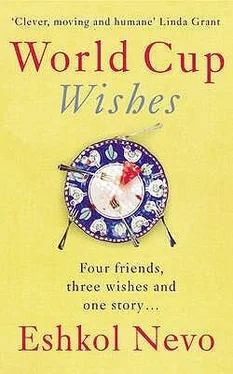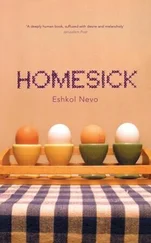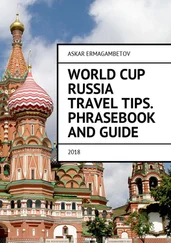Educational Division — that will act to instil human rights principles among doctors and patients.
Legal Division — that will provide initial assistance to those whose rights have been infringed.
Amichai suggested adding a Doctors’ Rights Division to those three. All the problems stem from the fact that doctors work inhuman shifts, he claimed. You can’t expect a person who slept one hour at night to preserve the patient’s human rights.
Ofir objected strongly to the new division. It blurs our message, he said. People don’t have the ability to absorb more than one message in a campaign. And if we try to convey more, no one will understand what we actually want.
Why do you call it a campaign, it’s not a campaign at all, Amichai said angrily. Drop the ad-man shtick. We’re not trying to sell Coke here.
It doesn’t matter, Ofir insisted. You can’t, you just can’t cover all the issues in the world. Why don’t we set up a special division for women’s rights and a special division for controlling prices in hospital cafeterias?
*
They kept that argument going for a whole week and, because of it, cancelled their weekly squash game for the first time ever.
Every Tuesday night at ten, they would sweat rivers on the number two court of the university’s sports centre, smashing the small black ball against the wall, against the glass, hurrying, their soles squealing, to get at it before it bounced twice, bumping into each other accidentally, or deliberately.
Then they would sit in the upholstered stands that looked down on the courts, drink water (Ofir) and chocolate milk from the vending machine (Amichai), watch the female students coming back from their aerobics class, and argue about which one looked hot.
Argue about whether it was better to rent on property or buy one.
Argue about whether jogging on tarmac damaged their feet or not.
Argue about whether the name of the boy who was abducted once by the ultra-Orthodox was Yoss’ele Shumacher or Yoss’ele Tzurbacher.
Amichai and Ofir never agreed on anything, ever. And even if at a certain moment in a conversation, there was, God forbid, the chance they might agree, one of them would immediately harden his position so there would be tension. When I first met them, I thought it was a matter of time before those endless arguments destroyed their friendship, but as the years passed, I began to understand that those arguments were exactly what held them together, and when Ilana died, Amichai asked his brother to call Ofir first, and that says a lot, because the decision about who to call first after a very happy or terribly sad event comes from your gut, not your mind. You call the person you feel closest to, your best friend, and that was what Amichai must have felt towards Ofir, perhaps because they had those weekly squash games of theirs, which allowed them to be as nasty as they wanted to each other, no explanations needed, to channel all the tension that had built up between them into scoring points, into winning, into the satisfaction you get from beating a person who has something basic that lights a fire under you.
Over the years, those Tuesday squash games managed to survive everything — even the time when Ofir, back from India, announced that he wouldn’t play for points any more because competitiveness is the mother of all sin, and also the time when Amichai lost on purpose as another way of punishing himself after Ilana’s death.
And now it was that petty argument about the Doctors’ Rights Division that suspended the institution we had all been sure would last for ever.
Without the squash, there was no place where they could vent their anger at each other. And from one meeting about the organisation to the next, their tone grew sharper, closer to the one they had used with each other before Ofir had donned his sharwals .
In the end, they deteriorated to the lowest point of any argument: historical generalisations.
That’s always been your problem, Amichai said. Everything with you has to be black or white.
No, that was always your problem, Ofir countered. You always have to insert something way out in your ideas so they can’t be put into action.
I listened to them sorrowfully. I knew that if it continued that way, our NPO would fall apart even before it was established. And then there would be nothing to keep Amichai from falling apart.
I didn’t know what to do. Usually, Churchill would get them out of those skirmishes: he’d quieten them down, sometimes reprimand them, and they would retreat to their corners of the ring till the next round. But Churchill was busy and there was no one to stop their mad dash down the slippery slope of anger and resentment.
I have an idea, I said after another bitter argument about the Doctors’ Rights Division ended with Amichai going out to the open balcony to work on the Titanic puzzle and Ofir putting his papers into his briefcase and threatening to leave.
They both looked at me unenthusiastically.
What do you sa-a-a-y … — I tried to stretch out the time in the hope I’d get an idea — What do you say about instead of having a Doctors’ Rights Division , we have a Doctors’ Rights Unit .
What do you mean? they asked together. My suggestion was so vague that there was no way to explain it except by repeating it with nicer phrasing.
I mean … that alongside the three main arms, there’ll be a smaller, secondary unit to handle doctors’ problems.
Ofir put his briefcase on the floor. Amichai came back from the balcony into the living room, but remained standing.
I think I can live with that for the time being, Ofir said without looking up from his briefcase.
Look, it’s not ideal … Amichai said tentatively.
Think of it as just a declaration of intention, I encouraged them. Things will still change when the organisation is actually established.
OK, if it’s just a declaration of intention, he said.
*
After that huge hurdle had been removed from the agenda, the way to finishing the presentation was open. At the same time, we gave Ya’ara the green light to arrange meetings with potential donors.
At her suggestion, we limited our search at the start to people who might have a personal connection to the subject: someone with a relative who recently died of a disease or, even better, someone who personally suffered from an infringement of his rights or from medical negligence. It wasn’t easy to find people among the wealthy of Miami who fitted that description. Most of them had private doctors who had extended their lives and those of their relatives time and time again. Another difficulty we faced was Amichai’s restriction: a potential donor had to be someone who occasionally visited Israel, because as much as he might like to, he couldn’t go abroad with the presentation and leave his children here, without their father.
In the end, with massive help from her father, Ya’ara succeeded in arranging a month of appointments for us around Passover time.
On the phone, she dictated to me the names of the hotels and the exact dates, and when she finished, she said, don’t get your hopes up too high. Those people didn’t become millionaires because they spread their money around, you know.
Still, I said, you did a great job organising this.
I think that what you’re all doing to help Amichai is very … moving. The way you’re helping him to keep busy.
Honestly, I admitted, it’s fun. Since our high school graduation play, we haven’t done anything together but watch football. And there’s something … bonding about it. You should see Ofir. The way he enjoys sitting with us, thinking, creating. You can see how much he misses it. It’s just a shame that Churchill …
Читать дальше












